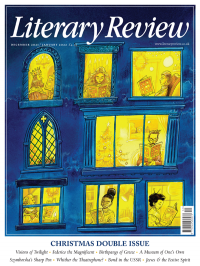Julian Baggini
The Art of Losing
On Consolation: Finding Solace in Dark Times
By Michael Ignatieff
Pan Macmillan 304pp £16.99
Failure, bereavement, decrepitude, disappointment, separation, betrayal: throughout human history, such vicissitudes have driven people to seek consolation. Today, however, most don’t want to be consoled – they want to be made whole again. As Michael Ignatieff writes in his quietly heroic attempt to make consolation fit for purpose once more, our therapeutic culture treats any suffering as ‘an illness from which we need to recover’. Consolation is a prize only for losers.
Ignatieff is battling the zeitgeist in reminding us that to be a loser is just the human condition. In the age of positive thinking, when the secular amulets of mindfulness, exercise and good diet can supposedly ward off all evil spirits, any acceptance of the inevitability of brokenness that

Sign Up to our newsletter
Receive free articles, highlights from the archive, news, details of prizes, and much more.@Lit_Review
Follow Literary Review on Twitter
Twitter Feed
It wasn’t until 1825 that Pepys’s diary became available for the first time. How it was eventually decrypted and published is a story of subterfuge and duplicity.
Kate Loveman tells the tale.
Kate Loveman - Publishing Pepys
Kate Loveman: Publishing Pepys
literaryreview.co.uk
Arthur Christopher Benson was a pillar of the Edwardian establishment. He was supremely well connected. As his newly published diaries reveal, he was also riotously indiscreet.
Piers Brendon compares Benson’s journals to others from the 20th century.
Piers Brendon - Land of Dopes & Tories
Piers Brendon: Land of Dopes & Tories - The Benson Diaries: Selections from the Diary of Arthur Christopher Benson by Eamon Duffy & Ronald Hyam (edd)
literaryreview.co.uk
Of the siblings Gwen and Augustus John, it is Augustus who has commanded most attention from collectors and connoisseurs.
Was he really the finer artist, asks Tanya Harrod, or is it time Gwen emerged from her brother’s shadow?
Tanya Harrod - Cut from the Same Canvas
Tanya Harrod: Cut from the Same Canvas - Artists, Siblings, Visionaries: The Lives and Loves of Gwen and Augustus John by Judith Mackrell
literaryreview.co.uk